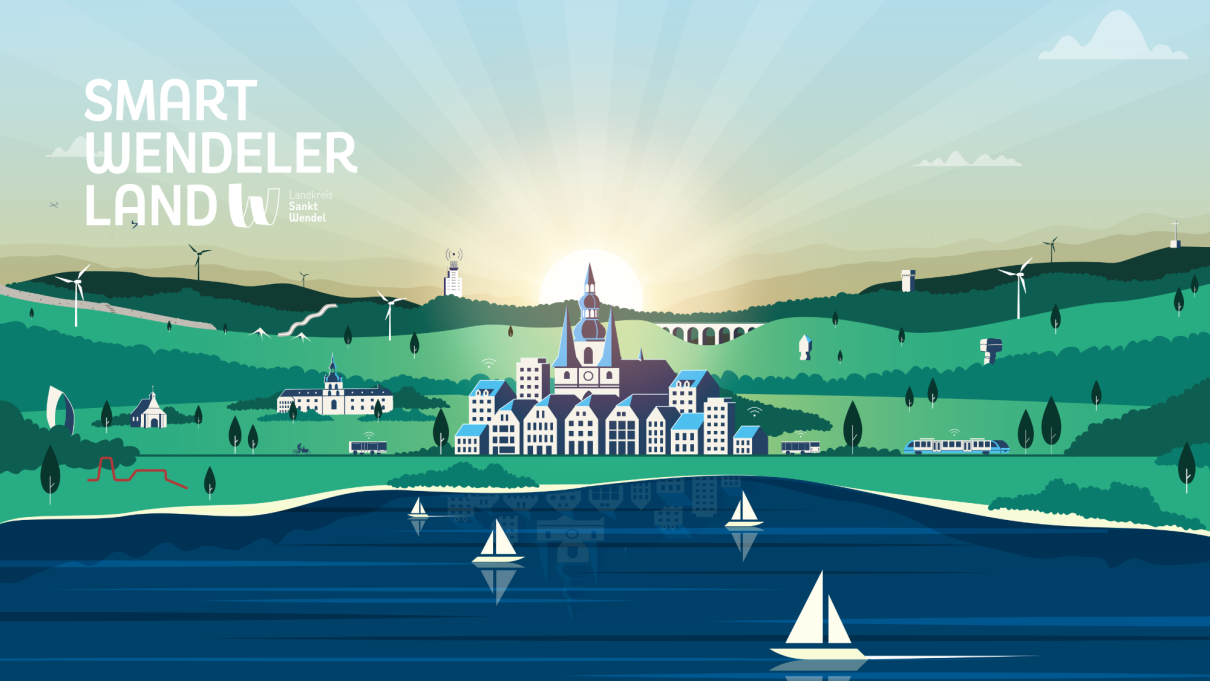Page content
The Sankt Wendel region on its way to becoming a smart region

Starting digitalization from scratch - that is the task facing the Smart Wendel region. Image: Digitalization department of the district of Sankt Wendel
“The district of Sankt Wendel has made a conscious decision to actively tackle the topic of Smart Region/Smart City in order to take advantage of the many opportunities offered by digitalization for sustainable regional development and to overcome the challenges facing rural regions, such as demographic change, the shortage of skilled workers, high car density and other infrastructural deficits,” says Lukas Schommer from the Digitalization Office in the district of Sankt Wendel.
10 fields of action for the Smart Region
The district has defined 10 subject areas and projects in which the digital transformation is to have an impact - from mobility and regional value creation to health and care, as many aspects of daily life as possible are to be considered, says Schommer.
One particularly successful initiative is “Smart, Land, Bus”.This demand-responsive on-call bus works via an app and efficiently combines journeys to avoid empty runs and reduce emissions. This pilot project has even been extended to other municipalities in Saarland under the name “flitsaar”. “This makes the region more mobile and more connected,” says Schommer.
Another example is the “Raw Material Data” project, in which LoRaWAN sensors were installed at strategic locations. These measure water levels and weather data in real time and help to detect the risk of flooding at an early stage.The sensors were used earlier this year when the rainfall was very high. Civil protection and the fire department were able to access the data from the water level sensors and quickly take flood protection measures.
All data converges on a data platform developed in-house. The platform was developed as part of the Südwest Cluster, a network of smart cities in Rhineland-Palatinate and the district of Sankt Wendel. “The processed data supports the district administration and its municipalities in planning and decision-making processes - supplemented by smart services and applications that improve social life and services of general interest,” says Schommer.
Not without the citizens
In addition to the technological measures, citizen participation in the region is a key issue. Through analog and digital formats such as workshops and online surveys, people are actively involved in the planning process. In this way, the Smart Wendel region is not only becoming smarter, but also more social and sustainable.
It is particularly exciting to see how older and younger people in the region react to the project: “We have already noticed that the commitment and affinity of older people in dealing with technology is often underestimated. Despite their daily contact with digital media, there is still a great need for explanation among young people.That's why in the Smart Wendel region we speak of digitally non-affine people, which includes all age groups.” The training courses and workshops relating to the Smart Region projects are therefore offered to everyone and not just a specific age group. “Through the diverse approaches, we want to ensure that people who are not digitally affine are not only taken along, but actively involved in the digital transformation of the region.”
The Smart Region project also has a very analog impact, says Schommer: “By revitalizing the village centers in the municipalities, we are also creating local contact points that offer personal support and advice. Here, people who are not digitally native can get information and individual support.”
“Don't view digitalization in isolation”
Lukas Schommer has five specific tips for cities and municipalities on the way to becoming a smart city/smart region:
- Define a clear vision and mission: Create a shared vision and mission that unites and motivates all stakeholders, taking into account regional challenges and potential.
- Promote participation and communication: We held creative workshops, participation formats and interviews with a wide range of stakeholders. We also visited local communities with our Infomobile and at local events. It is crucial that people feel involved and listened to, as they are the users of digital solutions.
- Plan integrated and connected measures: Digital projects should not only be linked to local conditions and needs, but should also be integrated with each other (e.g. forwarding from the district app to flitsaar).
- Continuous coordination and flexibility: Regular coordination within the administration and in selected committees helps to react quickly to changes and new findings and to continuously improve the strategy.
- Building on existing structures: We started with a detailed status quo analysis to identify and build on existing projects, structures and resources. This saves time, costs and resources.
Vision instead of conclusion
As in most other smart cities and smart regions, there is no final stage in the digital transformation. Instead, Schommer emphasizes that the Sankt Wendel region has a clear vision: “We want to use digitalization to make our region fit for the future without losing the local conditions and sense of community.” Unlike in many smart cities and metropolitan areas, many basic structures do not exist here in the countryside and must first be rebuilt. “Digitalization is not a static process, but requires constant adaptation and further development in order to meet the unique requirements of our region.”
The Smart Wendel region will continue to receive financial support from the “Smart Cities Model Projects” funding program until the end of 2027: “We are now laying the foundations for a long-term transformation that will make the Sankt Wendel region even more liveable and modern,” Schommer concludes.
Become an exhibitor at #SCCON25
As a driving force for the future of digital administration and for equal digital living and working conditions in cities and rural areas, the Smart Country Convention is a must for all stakeholders who actively advance the digital transformation. Are you interested in advancing the digitization of our cities and municipalities too? Join us and position your company or municipality as an expert in digitalization in the public sector.



